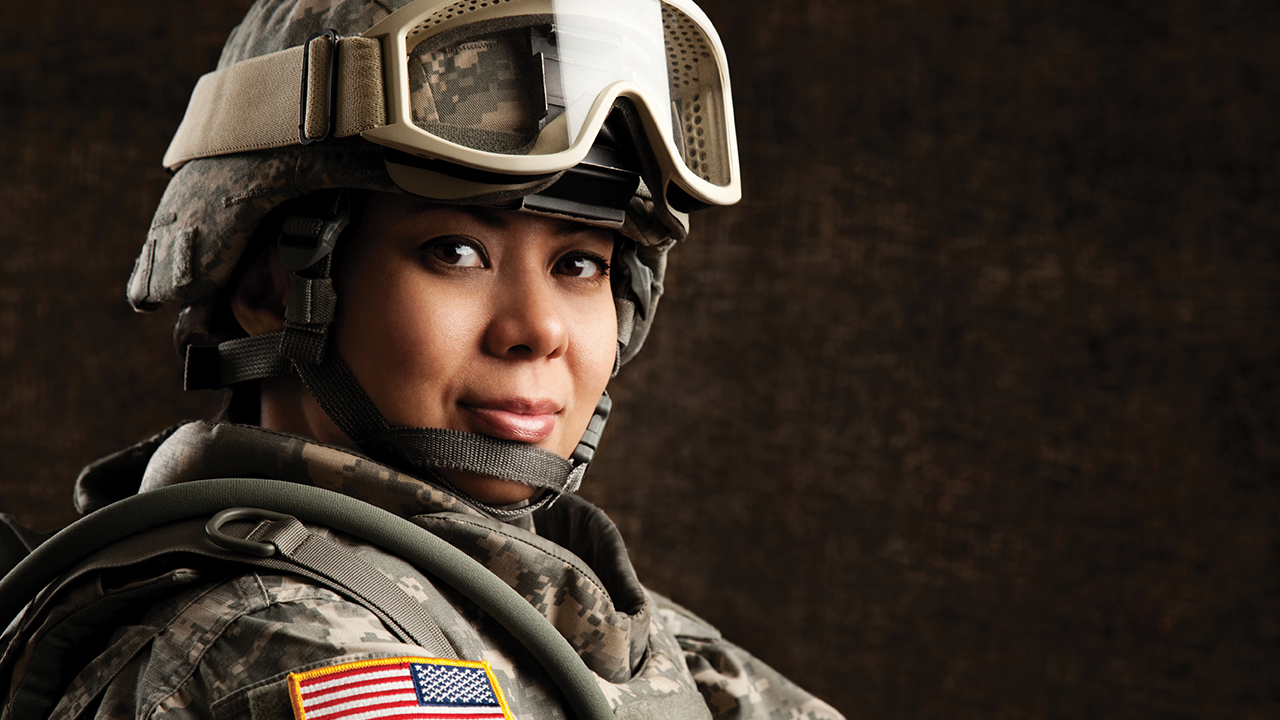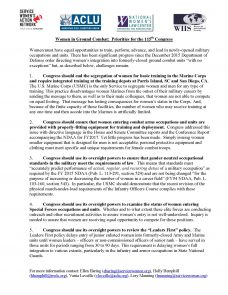Abortion rights, women of color, and LGBTQI+ people are under attack. Pledge to join us in fighting for gender justice.

 Women must have equal opportunities to train, perform, advance, and lead in newly-opened military occupations and units. There has been significant progress since the December 2015 Department of Defense order directing women’s integration into formerly-closed ground combat units “with no exceptions” but, as described below, challenges remain.
Women must have equal opportunities to train, perform, advance, and lead in newly-opened military occupations and units. There has been significant progress since the December 2015 Department of Defense order directing women’s integration into formerly-closed ground combat units “with no exceptions” but, as described below, challenges remain.
1. Congress should end the segregation of women for basic training in the Marine Corps and require integrated training at the training depots at Parris Island, SC and San Diego, CA. The U.S. Marine Corps (USMC) is the only Service to segregate women and men for any type of training. This practice disadvantages women Marines from the outset of their military careers by sending the message to them, as well as to their male colleagues, that women are not able to compete on equal footing. That message has lasting consequences for women’s status in the Corps. And, because of the finite capacity of those facilities, the number of women who may receive training at any one time and then accede into the Marines is artificially limited.
2. Congress should ensure that women entering combat arms occupations and units are provided with properly-fitting equipment for training and deployment. Congress addressed this issue with directive language in the House and Senate Committee reports and the Conference Report accompanying the NDAA for FY2017. Yet little progress has been made. Simply issuing women smaller equipment that is designed for men is not acceptable; personal protective equipment and clothing must meet specific and unique requirements for female combat troops.
3. Congress should use its oversight powers to ensure that gender-neutral occupational standards in the military meet the requirements of law. This means that standards must “accurately predict performance of actual, regular, and recurring duties of a military occupation” as required by the FY 2015 NDAA (Pub. L. 113-291, section 524) and are not being changed “for the purpose of increasing or decreasing the number of women in a career field” (FY94 NDAA, Pub. L. 103-160, section 543). In particular, the USMC should demonstrate that the recent revision of the physical march-under-load requirements of the Infantry Officers Course complies with these requirements.
4. Congress should use its oversight powers to examine the status of women entering Special Forces occupations and units. Whether and to what extent these elite forces are conducting outreach and other recruitment activities to assure women’s entry is not well-understood. Inquiry is needed to assure that women are receiving equal opportunity to compete for these positions.
5. Congress should use its oversight powers to review the “Leaders First” policy. The Leaders First policy delays entry of junior enlisted women into formerly-closed Army and Marine units until women leaders – officers or non-commissioned officers of senior rank – have served in those units for periods ranging from 30 to 90 days. This requirement is delaying women’s full integration to various extents, particularly in the infantry and armor occupations in State National Guards.
For more information contact: Ellen Haring ([email protected]), Holly Hemphill
([email protected]), Vania Leveille ([email protected]), Lory Manning ([email protected])

